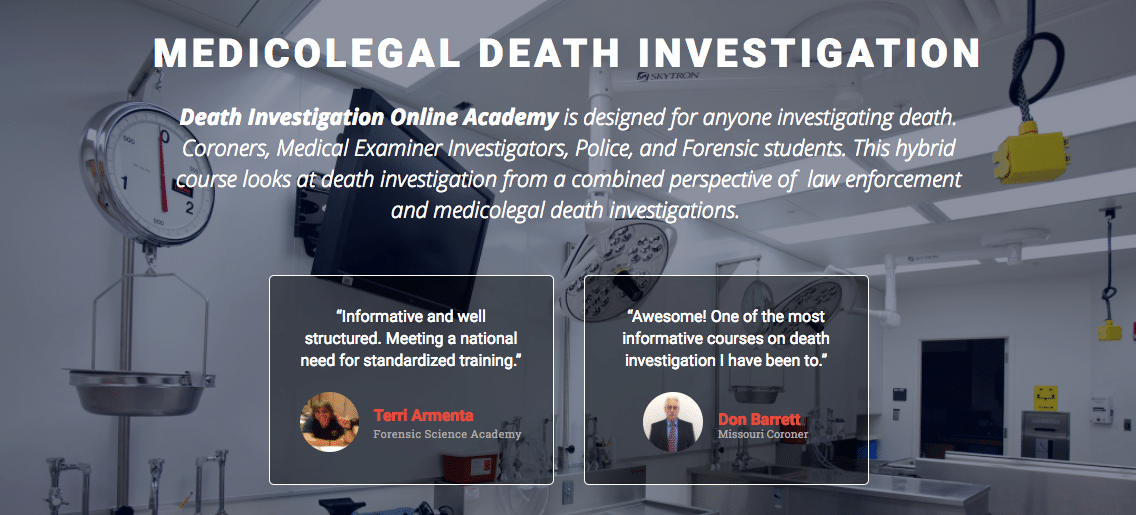 Rules that Govern an Investigation
Rules that Govern an Investigation
The purpose of an investigation is to obtain information that will provide clues for further inquiry, establish facts on which to base probable cause and develop enough evidence to convict the perpetrator
All of these actions are governed by a number of rules that apply to all facets of the investigation. Those rules are commonly referred to as rules of evidence. If an investigator violates any of the rules of evidence during the investigation the evidence gathered may be declared inadmissible in court and therefore create an obstacle for the prosecution.
Using Deception
While there are times when it is permissible to use deception when performing an investigation, it is important to understand the limited times when deception is appropriate. Undercover operations employ deception when investigators pose as criminals to gain the confidence of suspects or suspect groups.
However, the use of deception has its limitations and does not include the actual evidence, reports, or other types of information submitted to be true and accurate.
If an investigator does any of the following it not only negates the value of the evidence but also may be the basis for the investigator to become the subject of a criminal investigation.
- Creating evidence or planting evidence
- Lying in court (testifying)
- Lying in reports, notebooks, or other administrative or investigative reports
- Lying in any administrative or civil proceedings
Searches
Investigators often must conduct searches to obtain physical evidence. Those searches must fall within the restrictions of the 4th amendment to be considered reasonable and the evidence obtained from the search to be admissible.
Searches for evidence fall into two primary categories.
1.) A search pursuant to a duly executed search warrant; and
2.) A warrantless search.
Searches Pursuant to a Warrant
Searches pursuant to a warrant are subject to challenge based on the credibility of the information used to apply for the warrant. Should that information be deceptive it could lead to the fruit of the search being declared inadmissible in a suppression hearing.
When a search warrant is challenged the defendant has the burden of proof to show the warrant to be defective. The defendant’s motion to suppress the evidence may be based on one of the following:
- The warrant was improper upon its face or illegally issued, including the issuance of a warrant without a proper showing of probable cause;
- That the property seized was not that described in the warrant and that the officer was not otherwise lawfully privileged to seize the same;
- That the warrant was illegally executed by the officer; and
- That in any other manner the search and seizure violated the rights of the person involved.
Warrantless Searches
A search without a warrant is presumed unreasonable and the evidence will be excluded unless it falls into one of the exceptions to the warrant requirement. There are some exceptions but it is recommended that, if possible, a search warrant should be obtained.
Warrantless searches may be considered permissible under exigent circumstances. The United States Supreme Court has outlined the exigent circumstances exception as follows:
A warrantless intrusion into a home may be justified by:
1.) Hot pursuit of a fleeing felon; or
2.) Imminent destruction of evidence; or
3.) The need to prevent a suspect’s escape; or
4.) The risk of danger to the police or to other persons inside or outside the dwelling.
** In absence of Hot Pursuit, there must be probable cause that one or more of the other factors were present.
** In assessing the risk of danger, the gravity of the crime and likelihood that the suspect is armed should be considered.
Consent Searches
There are times when an officer asks for and is granted permission to search. This is known as a consent search. When a consent search produces evidence the burden of proof falls upon the prosecution to show by a preponderance of the evidence that the consent was freely and voluntarily given under the totality of the circumstances
Consent searches face the following challenges:
- Was consent voluntarily given under totality of the circumstances?
- Did the scope of the search exceed the consent given?
- Did the person consenting have the authority or apparent authority to give the consent?
Interviewing Suspects and Witnesses
When questioning a suspect it is important to understand when the subject should be given the Miranda warning and when the suspect has a right to an attorney.
Miranda is a protection under the 5th amendment regarding self-incrimination. Miranda applies if:
- The person is in custody; and
- Being asked guilt seeking questions.
While this may seem pretty simple courts tend to view the circumstances from the suspect’s perspective. The argument then becomes a subjective issue. The courts consider whether the suspect felt he was in custody and not free to go.
The Miranda ruling was intended to eliminate the “inherently coercive” atmosphere that exists in a custodial environment. Therefore, the requirement for Miranda only exists when the suspect believes he/she is in custody.
Right to Counsel
The right to an attorney also applies to any person feeling they have become a subject of an investigation and are being asked guilt seeking questions. The 6th amendment protects the accused’s right to counsel in any criminal proceeding.
Two significant elements are “accused” and “criminal proceedings”.
When interviewing suspects, the violation of the 5th and 6th amendments could result in suppression of the evidence.
When a suspect requests a lawyer the investigator must terminate the interrogation. In State v Harris the court held that the defendant unambiguously asked for an attorney and therefore the information derived from subsequent questioning was inadmissible. This holding is compatible with the Fifth and Sixth Amendments guaranteeing the accused’s right to have the assistance of counsel for his defense.
The Sixth Amendment right to counsel has been extended to the following:
- The interrogation phase of a criminal investigation
- The trial itself · Sentencing
- At least an initial appeal of any conviction
When the Right to Counsel Attaches
Supreme Court case law indicates that the Sixth Amendment right to counsel attaches when judicial proceedings have begun against a suspect by means of preliminary hearing, indictment, information, arraignment, or formal charging. This includes any proceedings that take place subsequent to the charging of an individual. For purposes of an investigation, the charging process starts with the probable cause statement.
This, however, the absence of formal charges does not preclude the suspect’s right to an attorney prior to being charged. Both the Fifth and Sixth Amendments to the U.S. Constitution involve the right to counsel. While sometimes overlapping, there are several differences between these rights.
The Fifth Amendment right to counsel was recognized as part of Miranda v. Arizona and refers to the right to counsel during a custodial interrogation; the Sixth Amendment ensures the right to effective assistance of counsel during the critical stages of a criminal prosecution.
Therefore, prior to charging a suspect, the right to counsel still applies based on the principles set forth in the Miranda advisement. Under the Fifth Amendment, a person must be given Miranda warnings, including informing the suspect of their right to an attorney, before a custodial interrogation by a law enforcement officer. If an individual is not warned of his or her Miranda rights, any information gained through an interrogation is inadmissible in court. Miranda warnings were put in place to allow a suspect to consult with an attorney before a custodial interrogation, even though the suspect may not have been formally arrested.
Once a suspect invokes his/her right to counsel, an investigator may no longer ask guilt-seeking questions.
 Death Investigator Magazine
Death Investigator Magazine
A digital magazine focused on the death investigation community. Dedicated to improving skills and enriching lives of investigators.
 Medicolegal Death Investigation – Online Academy
Medicolegal Death Investigation – Online Academy

The Death Investigation Training Academy was founded to play an integral role in the death investigation community. The need for quality accredited training is in short supply and high demand. Using a combination of classroom training, live on site scenario exercises, and web-based training, the Death Investigation Training Academy is filling the need of 21st-century investigators.

coroner,police training, darren dake,sheriff,deputy,coroner association,murder scenes,auto fatalities,csi,first responders,autoerotic fatalities,become a coroner,forensic science crime scene investigation,forensic science crime,scene investigator,forensic training,forensics training,how to be a crime scene investigator,how to become a death investigator,how to become a medical examiner,how to become a medical examiner investigator,medical examiner investigator training,medical investigator training,medicolegal death,medicolegal death investigator training,murder scenes,pictures of murder scenes,murder,real murder crime scenes,traffic deaths,traffic fatalities,what does it take to be a coroner,what does it take to be a criminal investigator,firefighter,fire training,firefighter training,autoerotic fatalities,become a coroner,coroner information,crime scene clean up training,crime scene cleaning training,crime scene cleanup training,crime scene investigation,crime scene investigation classes,crime scene investigator courses,crime scene investigator school,crime scene jobs,crime scene photography,crime scene photography training,crime scene technician,crime scene technician training,crime scene training,criminal investigation,criminal investigator,criminal justice,criminal justice forensic science,criminal justice forensics,criminal scene investigation,death crime scenes,death investigation training,death investigator training,death investigators,forensic death investigator,forensic investigator,forensic photography, crime scene clean up,crime scene bio-hazard, using plants in criminal investigation,forensic botany,dr.jane bock,death investigator magazine,dr judy melinek,badge of life,american college of forensic examiners,acfei,american board of medicolegal death investigators,abmdi,matthew lunn,underwater crime scene,mike berry,online learning,lopa,cultural diversity,anger de-escalation, coroner school,


 This exclusive first of its kind Medicolegal Death Investigation (MLDI) kit contains all the items you need to document and collect evidence from the most important piece of evidence at any death scene – The Body. Designed for Coroners, Medical Examiner Investigators, and anyone responsible to investigate and process a death.
This exclusive first of its kind Medicolegal Death Investigation (MLDI) kit contains all the items you need to document and collect evidence from the most important piece of evidence at any death scene – The Body. Designed for Coroners, Medical Examiner Investigators, and anyone responsible to investigate and process a death.